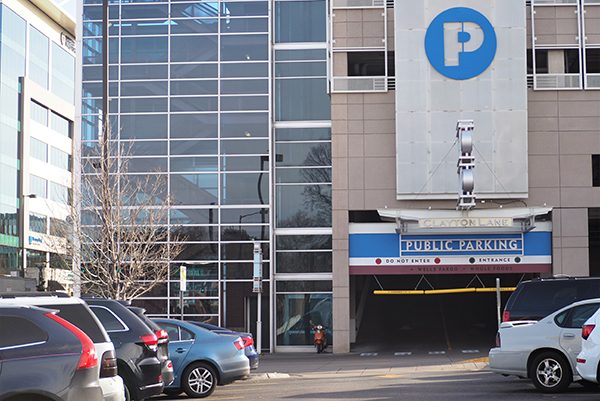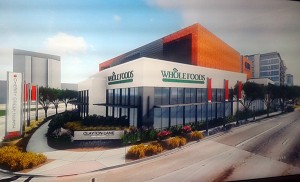The city of Denver has sold its share of a parking garage in Cherry Creek — but not to the buyer approved by City Council in early 2019.
On June 22, 18 months after city leaders signed off on selling 198 parking spaces in the garage north of Whole Foods to Clayton Lane Investors LLC — which owns the rest of the structure — the city instead sold the spaces to Denver-based Nichols Partnership.
The sale complicates long-discussed plans to redevelop the area, and public records show Clayton Lane Investors mounted a last-minute effort in court to prevent the sale. But it was unsuccessful.
The background
The 198 parking spaces at the center of the deal are on the upper two levels of the garage along 2nd Avenue, adjacent to the grocery store.
The city purchased the parking spaces in March 2003 for $4.7 million, according to public records. Jeff Steinberg, the city’s director of real estate, told city council members in 2018 that the spots were purchased so the city could rent them out for cheap rates to Cherry Creek retail workers. At the time, the shopping district had few parking meters, so workers parked on the street, which made it challenging for shoppers to find a spot.
The idea didn’t work out as well as expected, Steinberg said at the time.
The 198 spaces comprise only part of the garage. The remainder of it is owned by Clayton Lane Investors, a partnership between Brookfield and Invesco Real Estate. That entity owns much of the property between 1st and 2nd avenues from Josephine Street to Detroit Street. Its holdings include the building used by Whole Foods and the former Sears store, which has been vacant since 2015. The area is known as Clayton Lane.
Clayton Lane Investors previously had indicated it wants to redevelop the site. In 2016, at a national real estate conference in Las Vegas, OliverMcMillan — which Brookfield acquired in 2018 — displayed renderings showing a new Whole Foods erected on what is currently the store’s parking lot.
In 2018, city staff asked council members to sign off on selling the 198 spaces for $6 million to Clayton Lane Investors. Steinberg said the garage was set to be demolished as part of the planned redevelopment, and that Clayton Lane Investors needed to buy back portions of the site that it does not own. A company spokeswoman disputed that characterization at the time, saying that there was “no current plan to demolish the structure” and that the company planned to buy the spaces so it could “operate the structure more efficiently.”
Council approved the deal on Jan. 2, 2019.
The sale
Ultimately, the city didn’t sell the parking spaces to Clayton Lane Investors.
Instead, on June 22, Nichols Partnership, acting as Clayton Street Associates LLC, purchased the spaces for $6 million, the same price that Clayton Lane had planned to pay, public records show.
Nichols is a prominent Denver development firm. The company developed one office building on Platte Street, where coworking firm Galvanize operates, and earlier this year it broke ground on a second a short distance away. The company also plans to redevelop the former Art Institute of Colorado building in Capitol Hill.
Nichols is also the original developer of Clayton Lane and built the parking garage.
The lawsuit
Court documents provide details on what happened between January 2019 and June 22.
On June 15, a week before the sale to Nichols closed, Clayton Lane Investors sued both the firm and the city in an effort to stop the deal.
The lawsuit states that Clayton Lane Investors still plans to redevelop the area, and pitches that as something that will significantly benefit the city.
“The re-developed property will, among other things, include …. residential and new retail and will replace the current Whole Foods with a state of the art Whole Foods,” the lawsuit reads. “The unsightly surface parking currently on the Property will be moved underground as the development will have approximately 1500 parking spaces underground, which will increase the amount of parking in Cherry Creek … Moreover, the development includes redevelopment and use of the now vacant building that use(d) to house Sears.”
In the lawsuit, Clayton Lane Investors said the sale didn’t close because the city determined that, as part of the deal in which it acquired the spaces in 2003, if the city wanted to sell the spaces, it had to give Nichols Partnership the first opportunity to buy them — a concept known as right of first refusal.
Clayton Lane Investors argued in the lawsuit that the sale to Nichols shouldn’t be allowed to go through because, while council had approved a sale of the spaces to Clayton Lane Investors, the body had not directly approved a sale to Nichols. And a sale to Nichols wouldn’t prompt redevelopment that would benefit the city, because Nichols would own only part of the structure.
Brookfield did not respond to a request for comment. Attorneys Lawrence Katz and Jason Spitalnick of Foster Graham Milstein & Calisher represented Clayton Lane Investors in the litigation. Katz did not respond to a request for comment.
The city’s response
In an affidavit filed in court, Josh Laipply, chief projects officer for the city of Denver, said that Clayton Lane Investors was made aware of the right of first refusal in October 2018, prior to council’s approval of the deal. Clayton Lane indicated at the time “they have purchased all rights and will indemnify in a purchase agreement,” he said.
Clayton Lane Investors went under contract to buy the parking spaces in January 2019, days after council approved the deal. The purchase agreement made Clayton Lane responsible for dealing with the right of first refusal, Laipply said.
Laipply said that the city granted Clayton Lane Investors 11 extensions spanning about eight months “to resolve issues related” to the right of first refusal. But on Oct. 11, 2019, the city told the entity it was not willing to extend further. Clayton Lane Investors sent a letter terminating the purchase agreement that day, he said.
In February 2020, Nichols Partnership “elected to exercise its rights” to buy the spaces for the $6 million that Clayton Lane Investors would have paid, Laipply said.
The deal with Nichols didn’t go before council because effectively, it already had been approved by city leaders in 2002 when the city initially agreed to buy the spaces, Laipply said.
Clayton Lane Investors’ argument failed to sway a judge, and the deal with Nichols closed on the date that had been planned.
Nichols on deal
Randy Nichols, president and founder of Nichols Partners, told BusinessDen he made the deal for a simple reason: It was a good one.
“We had this right of first refusal, and we looked at the price and felt it was a bargain, knowing the cost of constructing parking in an area like Cherry Creek,” he said.
Nichols said Clayton Lane Investors “likely weren’t aware” of his firm’s right of first refusal when it initially bought Whole Foods and part of the parking garage, because the city’s spaces weren’t part of the deal.
“They did a title search on the property they purchased, but had no reason to do a title search on the property they weren’t purchasing,” he said.
Nichols agreed that the city told Clayton Lane Investors of the right of first refusal prior to the deal going before council. But he said the firm never contacted him about it until after council’s January 2019 approval of the sale.
The deal puts Nichols in a powerful position. The garage can’t be torn down unless he agrees to sell his spaces, or some sort of other deal.
“We haven’t come to any common agreement on what might happen,” he said. “They’d obviously like to control it.”
But Nichols said he’s not the only one Clayton Lane Investors needs to woo. Whole Foods is in the middle of a long-term lease on its existing building, and as far as he knows, the grocer hasn’t agreed to a deal either.
“They have a couple different areas they’ve got to shore up … They’re obviously not ready to move ahead,” Nichols said.
The city of Denver has sold its share of a parking garage in Cherry Creek — but not to the buyer approved by City Council in early 2019.
On June 22, 18 months after city leaders signed off on selling 198 parking spaces in the garage north of Whole Foods to Clayton Lane Investors LLC — which owns the rest of the structure — the city instead sold the spaces to Denver-based Nichols Partnership.
The sale complicates long-discussed plans to redevelop the area, and public records show Clayton Lane Investors mounted a last-minute effort in court to prevent the sale. But it was unsuccessful.
The background
The 198 parking spaces at the center of the deal are on the upper two levels of the garage along 2nd Avenue, adjacent to the grocery store.
The city purchased the parking spaces in March 2003 for $4.7 million, according to public records. Jeff Steinberg, the city’s director of real estate, told city council members in 2018 that the spots were purchased so the city could rent them out for cheap rates to Cherry Creek retail workers. At the time, the shopping district had few parking meters, so workers parked on the street, which made it challenging for shoppers to find a spot.
The idea didn’t work out as well as expected, Steinberg said at the time.
The 198 spaces comprise only part of the garage. The remainder of it is owned by Clayton Lane Investors, a partnership between Brookfield and Invesco Real Estate. That entity owns much of the property between 1st and 2nd avenues from Josephine Street to Detroit Street. Its holdings include the building used by Whole Foods and the former Sears store, which has been vacant since 2015. The area is known as Clayton Lane.
Clayton Lane Investors previously had indicated it wants to redevelop the site. In 2016, at a national real estate conference in Las Vegas, OliverMcMillan — which Brookfield acquired in 2018 — displayed renderings showing a new Whole Foods erected on what is currently the store’s parking lot.
In 2018, city staff asked council members to sign off on selling the 198 spaces for $6 million to Clayton Lane Investors. Steinberg said the garage was set to be demolished as part of the planned redevelopment, and that Clayton Lane Investors needed to buy back portions of the site that it does not own. A company spokeswoman disputed that characterization at the time, saying that there was “no current plan to demolish the structure” and that the company planned to buy the spaces so it could “operate the structure more efficiently.”
Council approved the deal on Jan. 2, 2019.
The sale
Ultimately, the city didn’t sell the parking spaces to Clayton Lane Investors.
Instead, on June 22, Nichols Partnership, acting as Clayton Street Associates LLC, purchased the spaces for $6 million, the same price that Clayton Lane had planned to pay, public records show.
Nichols is a prominent Denver development firm. The company developed one office building on Platte Street, where coworking firm Galvanize operates, and earlier this year it broke ground on a second a short distance away. The company also plans to redevelop the former Art Institute of Colorado building in Capitol Hill.
Nichols is also the original developer of Clayton Lane and built the parking garage.
The lawsuit
Court documents provide details on what happened between January 2019 and June 22.
On June 15, a week before the sale to Nichols closed, Clayton Lane Investors sued both the firm and the city in an effort to stop the deal.
The lawsuit states that Clayton Lane Investors still plans to redevelop the area, and pitches that as something that will significantly benefit the city.
“The re-developed property will, among other things, include …. residential and new retail and will replace the current Whole Foods with a state of the art Whole Foods,” the lawsuit reads. “The unsightly surface parking currently on the Property will be moved underground as the development will have approximately 1500 parking spaces underground, which will increase the amount of parking in Cherry Creek … Moreover, the development includes redevelopment and use of the now vacant building that use(d) to house Sears.”
In the lawsuit, Clayton Lane Investors said the sale didn’t close because the city determined that, as part of the deal in which it acquired the spaces in 2003, if the city wanted to sell the spaces, it had to give Nichols Partnership the first opportunity to buy them — a concept known as right of first refusal.
Clayton Lane Investors argued in the lawsuit that the sale to Nichols shouldn’t be allowed to go through because, while council had approved a sale of the spaces to Clayton Lane Investors, the body had not directly approved a sale to Nichols. And a sale to Nichols wouldn’t prompt redevelopment that would benefit the city, because Nichols would own only part of the structure.
Brookfield did not respond to a request for comment. Attorneys Lawrence Katz and Jason Spitalnick of Foster Graham Milstein & Calisher represented Clayton Lane Investors in the litigation. Katz did not respond to a request for comment.
The city’s response
In an affidavit filed in court, Josh Laipply, chief projects officer for the city of Denver, said that Clayton Lane Investors was made aware of the right of first refusal in October 2018, prior to council’s approval of the deal. Clayton Lane indicated at the time “they have purchased all rights and will indemnify in a purchase agreement,” he said.
Clayton Lane Investors went under contract to buy the parking spaces in January 2019, days after council approved the deal. The purchase agreement made Clayton Lane responsible for dealing with the right of first refusal, Laipply said.
Laipply said that the city granted Clayton Lane Investors 11 extensions spanning about eight months “to resolve issues related” to the right of first refusal. But on Oct. 11, 2019, the city told the entity it was not willing to extend further. Clayton Lane Investors sent a letter terminating the purchase agreement that day, he said.
In February 2020, Nichols Partnership “elected to exercise its rights” to buy the spaces for the $6 million that Clayton Lane Investors would have paid, Laipply said.
The deal with Nichols didn’t go before council because effectively, it already had been approved by city leaders in 2002 when the city initially agreed to buy the spaces, Laipply said.
Clayton Lane Investors’ argument failed to sway a judge, and the deal with Nichols closed on the date that had been planned.
Nichols on deal
Randy Nichols, president and founder of Nichols Partners, told BusinessDen he made the deal for a simple reason: It was a good one.
“We had this right of first refusal, and we looked at the price and felt it was a bargain, knowing the cost of constructing parking in an area like Cherry Creek,” he said.
Nichols said Clayton Lane Investors “likely weren’t aware” of his firm’s right of first refusal when it initially bought Whole Foods and part of the parking garage, because the city’s spaces weren’t part of the deal.
“They did a title search on the property they purchased, but had no reason to do a title search on the property they weren’t purchasing,” he said.
Nichols agreed that the city told Clayton Lane Investors of the right of first refusal prior to the deal going before council. But he said the firm never contacted him about it until after council’s January 2019 approval of the sale.
The deal puts Nichols in a powerful position. The garage can’t be torn down unless he agrees to sell his spaces, or some sort of other deal.
“We haven’t come to any common agreement on what might happen,” he said. “They’d obviously like to control it.”
But Nichols said he’s not the only one Clayton Lane Investors needs to woo. Whole Foods is in the middle of a long-term lease on its existing building, and as far as he knows, the grocer hasn’t agreed to a deal either.
“They have a couple different areas they’ve got to shore up … They’re obviously not ready to move ahead,” Nichols said.




Leave a Reply